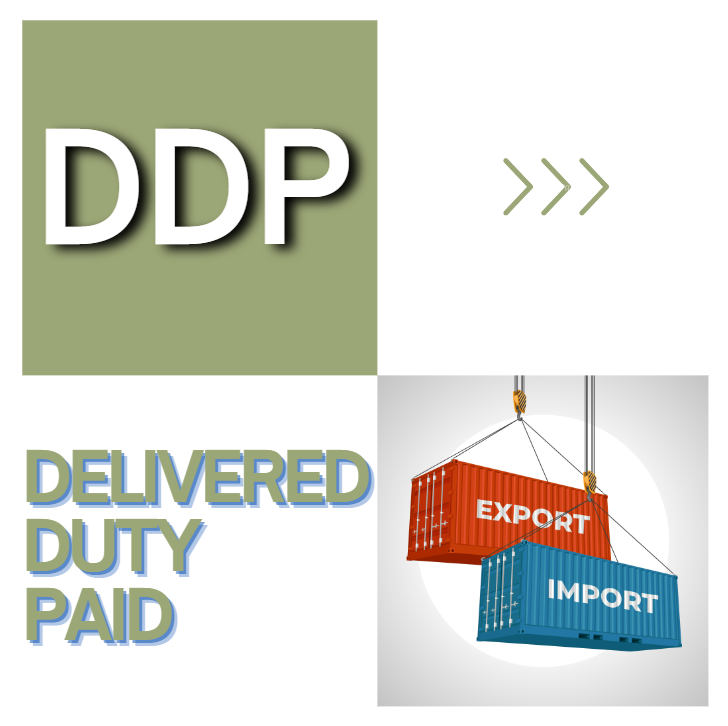AV e-Duniya's Perspective on DDP Shipping

What does DDP mean in shipping terms?
In an international transaction, the incoterm DDP is a form for "delivered duty paid" which is applicable to both air and marine freight imports, the seller assumes all responsibility for transporting the goods until they reach an agreed-upon destination. Up to the point where the items are delivered to the buyer's location, the seller is responsible for paying all costs associated with the transportation, import duties, taxes, and any other charges.
DDP Agreement: Buyers and Sellers Responsibilities
In the DDP shipping term, The supplier (seller) is responsible for all shipping arrangements, including import customs taxes, until the items are delivered to the customer. That means that all import and export expenses are the supplier's responsibility, and the customer is exempt from all expenditures associated with cargo shipment.
Buyer’s Responsibilities:
As far as procedures go, the buyer is only responsible for getting the goods. When the products are received, the procedure of unloading them is included. Unloading fees are the buyer's duty, so buyers need to know what they are, especially when sending goods to fulfillment locations.
The buyer needs to know that this Incoterm only covers the costs of shipping, taxes, and duties on imports and exports. Any other fees will likely be paid by the buyer.
Seller’s Responsibilities:
Most of the time, the seller will include all shipping costs in one price, which is called "landing costs." This is used as an overall quote for the services. When someone sells something, they'll probably say that the total value of their goods is DDP. When someone gives you a price and adds the Incoterm word DDP to it, it means that the price of the goods includes the cost of delivery and duty.
In addition to the deliverable of finished products, the seller bears the following commitments:
Creating sales agreements and other connected papers
Meeting all requirements for importing and exporting
Acknowledging and paying all import and export duties and fees.
All shipping costs, including transfer to a final location agreed upon
The price of every examination by the government
A record of delivery
The seller is in charge if there is damage or loss during shipping.
Who pays freight on DDP?
When you buy something through a DDP deal, the seller pays for all of the shipping costs, as well as any customs fees, import taxes, or VAT. In essence, the seller pays for everything that needs to be done to get the things to the buyer. You should know that the customer is in charge of any costs that come up with moving the goods.
Does DDP include Customs Clearance?
Under a DDP agreement, import taxes and VAT as well as customs clearance are under the purview of the product's seller. It is not the buyer's responsibility to pay for the costs of clearing customs when they buy goods under this deal.
What are the payment terms a factory requires when shipping DDP?
Payment terms and Incoterms are different. Thus, a seller is free to ask for any conditions they choose when it comes to payment.
Depending on the factory, final payment is often requested after items have crossed customs in China, but in other cases it is due once the products are on the boat.
Are DDP agreements a good idea when importing from China?
If a corporation is willing to pay more for low-quality transportation and does not want to divide the cost with their supplier and shipping company, a DDP agreement may be advantageous. FOB and other superior shipping methods are available from China; they are less expensive and carry a reduced risk of shipping delays and unforeseen complications.
Is it possible to reject a DDP shipment on arrival?
Yes, in principle; nonetheless, purchasers should read and comprehend their purchase agreements. Also, it's not uncommon for sellers to ask for a deposit before the items are even sent, so if the customer turns down a shipment, the seller would probably keep the money.
Who is the consignee and importer on record in a DDP shipment?
This varies by country of destination. Typically, while sending products to the United States, the seller is noted as the importer on record, and the final recipient would be a consignee.
Which party clears customs under a DDP agreement?
Under the DDP agreement, the party responsible for clearing customs is the seller. Importer information will be recorded under the seller's name or the name of the company they use to enter formalities. Additionally, under DDP, the seller has a duty to cover all customs charges; hence, the buyer is never held responsible for these costs when shipping via DDP.
Conclusion-Boosting International Trade with DDP
AV is managing the complicated world of global business, and choosing DDP is more than just a business decision—it's a promise to do the best job possible. By sending goods duty-paid, AV can not only improve their business, but they can also build stronger relationships with customers all over the world. When a smooth international trade process is critical to achieving success, DDP emerges as an emblematic representation of dependability and effectiveness.